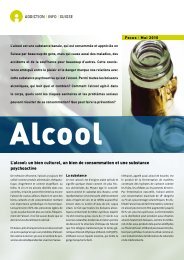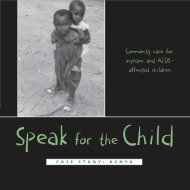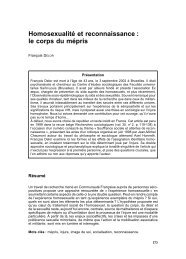Waking up to devastationThe toll on teaching…Education is an essential building block in a country’s development. In areas where <strong>HIV</strong>infection is common, <strong>HIV</strong>-related illness is taking its toll on education in a number ofways. First, it is eroding the supply of teachers <strong>and</strong> thus increasing class sizes, which islikely to dent the quality of education. Secondly, it is eating into family budgets, reducingthe money available <strong>for</strong> school fees <strong>and</strong> increasing the pressure on children to drop outof school <strong>and</strong> marry or enter the work<strong>for</strong>ce. Thirdly, it is adding to the pool of childrenwho are growing up <strong>with</strong>out the <strong>support</strong> of their parents, which may affect their ability tostay in school.Skilled teachers are a precious commodity in all countries, but in some parts of theworld, they are becoming too sick to work or dying of <strong>HIV</strong>-related illness long be<strong>for</strong>eretirement. The Central African Republic, where around one in every seven adults isestimated to be infected <strong>with</strong> <strong>HIV</strong>, already has a third fewer primary school teachersthan it needs. A recent study of the impact of <strong>HIV</strong> on the educational sector showedthat almost as many teachers died as retired between 1996 <strong>and</strong> 1998. Of those whodied, some 85% were <strong>HIV</strong>-positive, <strong>and</strong> they died an average of 10 years be<strong>for</strong>ereaching the minimum retirement age of 52. The study recorded that 107 schools hadclosed owing to staff shortages, <strong>and</strong> only 66 remained open. With the teacher shortageexpected to worsen, researchers calculate that over 71 000 children aged 6–11will be deprived of a primary education by the year 2005. A similarly dramatic impacthas been found in Côte d’Ivoire, where teachers <strong>with</strong> <strong>HIV</strong> miss up to six months ofclasses be<strong>for</strong>e dying (compared <strong>with</strong> 10 days missed by teachers dying of othercauses) <strong>and</strong> where confirmed cases of <strong>HIV</strong>/<strong>AIDS</strong> account <strong>for</strong> 7 out of 10 deathsamong teachers.In Zambia, deaths among teachers are very high <strong>and</strong> still rising rapidly. In the first 10months of 1998, Zambia lost 1300 teachers – the equivalent of around two-thirds of allnew teachers trained annually. <strong>AIDS</strong> may aggravate the existing disparity in educationalaccess between town <strong>and</strong> countryside. In a national survey of 6–15-year-olds in 1996,over 70% of those <strong>living</strong> in cities were enrolled in school, compared <strong>with</strong> just over half ofthose in rural areas. Rural postings are already unpopular among teachers in many countries,<strong>and</strong> the Zambian study suggested that the need to be close to a source of healthcare – a town or city – acted as an extra disincentive to teachers to go to rural areas.… the toll on learningIt is commonly assumed that children drop out of school when their parents die,whether of <strong>AIDS</strong> or another cause. While there has been little rigorous research, afew studies can point to <strong>AIDS</strong> in the family as a direct cause of school drop-out. Forexample, in a study of commercial farms in Zimbabwe, where most farmworkerdeaths are attributed to <strong>AIDS</strong>, 48% of the orphans of primary-school age who wereinterviewed had dropped out of school, usually at the time of their parent’s illness ordeath, <strong>and</strong> not one orphan of secondary-school age was still in school.29
Report on the global <strong>HIV</strong>/<strong>AIDS</strong> epidemic – June 2000In<strong>for</strong>mation collected in large household surveys representative of the general populationconfirms the general assumption that children whose parents have both diedare less likely to be in school than children who are <strong>living</strong> <strong>with</strong> one or both parents(see Figure 11).Figure 11. Proportion of children aged 10-14 who are still in schoolaccording to whether their parents are alive, surveys invarious countries, 1994-1998%100908070605040302010BeninCameroonChadCôte d'IvoireMaliNigerTanzaniaTogoHaitiBoliviaGuatemalaPeru<strong>living</strong> <strong>with</strong> one or both parentsboth parents deadSource: Demographic <strong>and</strong> Health Surveys, Macro International, USA, <strong>and</strong> UNICEF, 2000The impact of parental <strong>AIDS</strong> is not necessarily a direct one or seen only in childrenwho have already been orphaned. A child’s schooling may be temporarily interruptedby a shortage of cash occasioned by spending on a parent’s ill-health or by periodsof work in the home to help sick parents. By the time children are actually orphaned,they are likely to be over-age <strong>for</strong> their class, even if they are still in school. This wasthe case in both the Zimbabwean <strong>and</strong> Kenyan studies cited here. Being older thantheir classmates was in turn associated <strong>with</strong> a higher rate of dropping out of school<strong>for</strong> a number of other reasons, including pregnancy <strong>and</strong> the need to take payingwork. Many of the marriages that led to drop-out were arranged, so it is quite possiblethat relatives or sick parents themselves saw marrying a girl off as a relativelypainless way of ensuring that she would be cared <strong>for</strong> after their death. In at least onestudy of orphans in Kenya, boys tended to give economic reasons <strong>for</strong> dropping outof primary school (64% said they could not af<strong>for</strong>d fees or needed to earn cash from30











